Mainstream Media (MSM) and Citizen Journalism have never been happier bedfellows in all the talks I've been to than the talk on Journalism 2.0 by CNN's news anchor Kristie Lu Stout.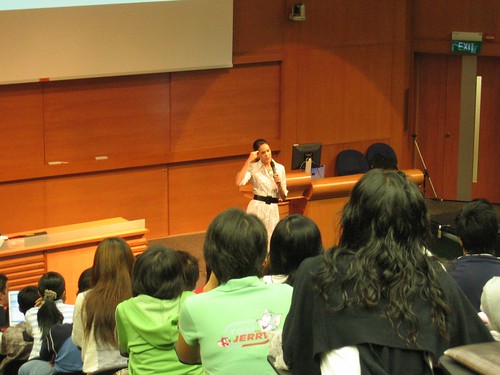
Unlike what I've previously speculated, this talk was organized by NUS' Communications and New Media Programme as part of its exposure module, NM1101E, lecture series. You can imagine my surprise when I entered the lecture theatre filled to the brim with fresh undergrads. 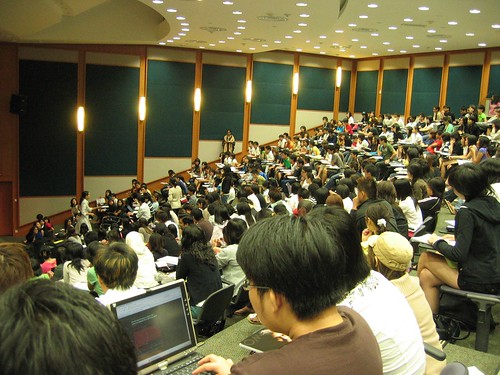
Usual talks on the topic of Journalism 2.0 in Singapore have always been a congregation of bloggers and tech geeks littered with familiar faces amongst the crowd. The last of such talks I attended was by the local vlog and social media evangelist, Kevin Lim or more popularly known as theory.isthereason, on "Youtube and Beyond". Most of these talks are usually chaired by citizen journalists or social media advocates. Of course, there were talks by Jennifer Lewis, editor of Straits Times' Stomp.com.sg during Nexus 2007 on crowdsourcing the media.
Apart from the difference in audience, what made Kristie's talk particularly different was her background. Although it would appear that her examples of MSM integration with citizen journalism were very CNN-centric, she did mention other examples like Korea's ohmynews which was said to have influenced the election of the current President of South Korea. She did mention Straits Time's Stomp but personally, Stomp is a far cry from CNN's I-Report which operates on similar principles of engaging citizen journalists to contribute videos, photos and news to CNN. However, I do wonder why CNN credit these I-reporters as "amateurs" rather than I-reporters if they truly wish to integrate the two medium.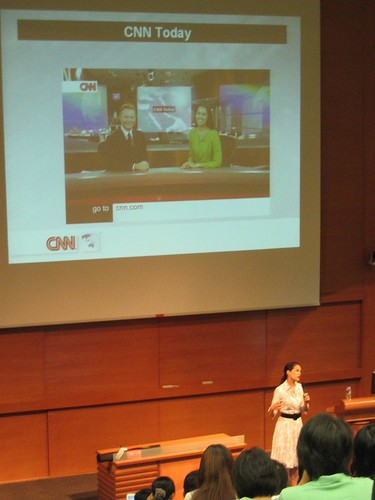
A key point which she mentioned was the need for more fact-checking, editorial and rigour in the writings and reporting by citizen journalists. This has always been the achilles' heel of journalism 2.0. She admits too that this requires a lot of resources and that CNN goes through great amount of double-checking and calling on sources which would not usually be available to citizen journalists. However, many journalism 2.0 websites which I admire like Wonkette, Ecorazzi and some Metroblogging cities usually have big team of contributors and resources. Sadly, they also set themselves up to appear as "gossip" sites which may do nothing for their credibility. Others like ohmynews work in an office no different from a traditional newsroom which says a lot on the amount of resources needed for a credible citizen journalism outfit.
Still we should not be disheartened. Kristie predicts that the future of Journalism 2.0 is moving towards greater social consumption of the news where people prefer to discuss with others about the news than to just react to it alone. She also advocates a greater integration between MSM and citizen journalism which in her words would be like a "CNN version of ebay live". An example is the recent CNN Youtube-debate where people film the questions they want to ask USA republican presidential candidates. In turn these questions are directed to the candidates for their response on TV.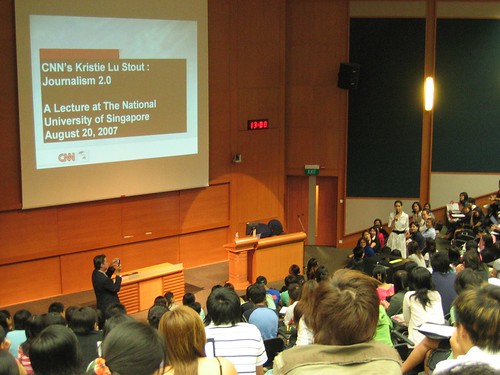
I believe Singaporeans have simply not reached that level of online-social activism where they will make video responses to videos on Youtube and our local mainstream media have also not yet embraced all possibilities of citizen journalism in their reporting. Of course, trivial things like waterspouts and fires in shopping centres dominate the videos that eventually get on TV. One thing I cannot deny is that mainstream media still get more reach than online medium. No matter how quickly the internet is expanding throughout Singapore and the world, there are still more people watching television. If the two medium can be effectively combined, we can reach a greater audience with more effective news coverage.
In response to a question from the audience about whether the rise of citizen journalism hints at the weakness of mainstream media, Kristie made a point which I particularly liked.
"Mainstream media thinks of themselves as the watchdogs of industry and government and citizen journalists are in effect the watchdogs of MSM. [It's always good] to keep everyone on their toes."While I am not able to reproduce every point that Kristie made at her talk, the take home message at the end of the day is the need for further integration between the two. MSM can take citizen journalists to a greater audience while MSM needs the additional inputs to evolve and expand. As citizen journalists, we should look into different ways of harnessing other mediums to broaden our reach.
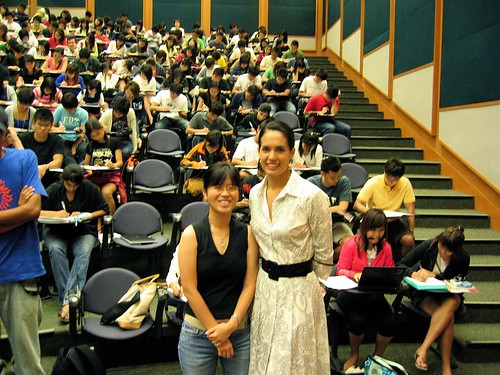
And of course, to embrace the essence of citizen journalism, this monkey did not fail to report LIVE from the talk via twitter, the latest up and coming web 2.0 tool where you can subscribe updates via phone and RSS feeds.
Related Reads:
Here are some websites that were mentioned during Kristie's talk

 I can be contacted at
I can be contacted at 







4 comments:
Great review of the event at NUS! Citizen Journalism is still a very vague term, so therein lies the problem of what's really going on. It's not exactly new that the news media has always called on citizens to share news with them.
I'll be plugging your post on my blog :)
"Mainstream media thinks of themselves as the watchdogs of industry and government and citizen journalists are in effect the watchdogs of MSM. [It's always good] to keep everyone on their toes."
But makes you wonder...Who will be the watchdogs of citizen journalists? Cause we are beginning to see more blogs with false information and reviews claiming so and so product is very good but in actual fact, its a paid advertisement.
Hi dk, the watchdog of the bloggers will be bloggers themseleves. I think after a while you can figure out which blogs are paid posts. Also, if you are blogger consistently putting out good stuff, you will be wary of putting mis-information or even if you do, you will be the first one to apologize and fix it. Great post MMM.
As usual, upon hindsight, I always feel there's more I could have added in the original posts but as usual, I feel that online media does not encourage the reading or even the presentation of long thesis of ramblings which I am partial to.
For fear of turning readers off, I should keep this short and sweet.
I particularly liked something acroamatic said in response to the ST reporter...
"One of the things we are taught in media studies is that news editors have to constantly leave out content from newspapers due to space and time constraints. No such issues exist with blogs."
I must add that even Kristie, in her talk, emphasized this! editors select and drop stories which citizen journalists and blogs can pick up. They fill in gaps and niches which MSM cannot fill. Also, MSM focuses on breaking news and chronic issues are often left out and these is where advocacy blogs can play a very big role!
Post a Comment